intro
Discover the top SQL learning platforms that can transform your data skills in weeks, from free YouTube channels to interactive courses that match your learning style.
If you've ever felt stuck trying to analyze large datasets or found yourself wishing you could automate those repetitive data tasks, you're not alone. Whether you're wrestling with spreadsheets that keep crashing or spending hours on manual data pulls, there's a better way forward.
Why SQL Changes Everything for Data Professionals
Here's the thing about modern data work: SQL isn't just nice to have anymore, it's how companies actually get things done with their data. Think about it: while you're copying and pasting between spreadsheets, SQL users are pulling insights from millions of records in seconds.
SQL has become the backbone of data operations because it lets you:
But here's what's really exciting: learning SQL used to mean slogging through dry textbooks and confusing documentation. Not anymore. The platforms available today make picking up SQL almost enjoyable, with interactive lessons, real-world projects, and step-by-step guidance that actually makes sense.
Whether you're starting from scratch or just want to level up your data skills, the right learning platform can turn what used to be a months-long struggle into a focused few weeks of progress.
Let's dive into the platforms that are making SQL accessible to everyone.
Learning Roadmap
Now that we've established the compelling case for SQL adoption, let's outline a structured approach to mastering this essential skill. A strategic learning path ensures efficient progress and builds confidence through achievable milestones
Phase 1: Foundation Building (Weeks 1-2)
The foundation phase focuses on developing comfort with SQL's declarative syntax and understanding how databases organize information differently from spreadsheets.
Master basic SELECT statements, filtering with WHERE clauses, and sorting with ORDER BY. Learn database structure concepts and how tables relate to each other. The beauty of SQL is its English-like syntax. Your first query might read: SELECT customer_name FROM customers WHERE purchase_date > '2024-01-01'.
This phase emphasizes understanding over speed. Take time to grasp why SQL approaches data differently from Excel, as this conceptual foundation will support all future learning.
Phase 2: Data Manipulation (Weeks 3-4)
Building on your foundational knowledge, this phase introduces SQL's powerful aggregation capabilities, which often provide Excel users with their first significant "aha!" moment.
Move into aggregate functions (COUNT, SUM, AVG) and GROUP BY clauses. This is where Excel users often experience their first breakthrough: tasks requiring multiple pivot tables become single SQL statements. Learn data cleaning techniques and basic string/date functions that will be essential for working with real-world data.
Phase 3: Advanced Querying (Weeks 5-8)
Master table joins (INNER, LEFT, RIGHT, FULL OUTER) to combine data across multiple sources. Explore subqueries and Common Table Expressions (CTEs) for complex analyses. Window functions unlock advanced analytics like running totals and rankings that require complex Excel workarounds.
Phase 4: Professional Application (Weeks 9-12)
Learn query optimization, understand different SQL dialects, and integrate with business intelligence tools. Focus on real-world problem-solving and performance considerations for production environments.
Now that we have an idea of the importance of the Structured Query Language and learning path, let us take a look at some of the platforms that offer educative materials on SQL.
Top Platforms for Learning SQL
Video-Based Learning Platforms
Video-based education offers visual demonstrations and step-by-step guidance that many learners find intuitive, particularly when transitioning from familiar tools like Excel to database environments. These platforms excel at showing rather than just telling, making complex concepts more accessible.
1. YouTube
YouTube stands out as the most accessible entry point for SQL education, offering high-quality content without financial barriers. This makes it ideal for exploring SQL concepts before committing to paid platforms or for supplementing formal education with diverse perspectives. As a free and accessible video-based learning platform, YouTube is best for Excel users beginning their transition to data analytics and those seeking free, flexible learning options that accommodate varying schedules and learning paces.
Strengths:
Below are some of the top SQL learning channels on YouTube, each offering unique approaches and specializations.
(I) Alex The Analyst
Alex The Analyst represents the premier choice for Excel users transitioning to data analytics careers, with content specifically designed to bridge the gap between spreadsheet analysis and database proficiency.

(II) freeCodeCamp
freeCodeCamp serves as a comprehensive education powerhouse, offering university-level content with the accessibility of online learning and the depth of formal computer science education.

(III) Programming with Mosh
Programming with Mosh delivers premium-quality instruction that reflects decades of professional experience and corporate training expertise, ensuring content meets industry standards.
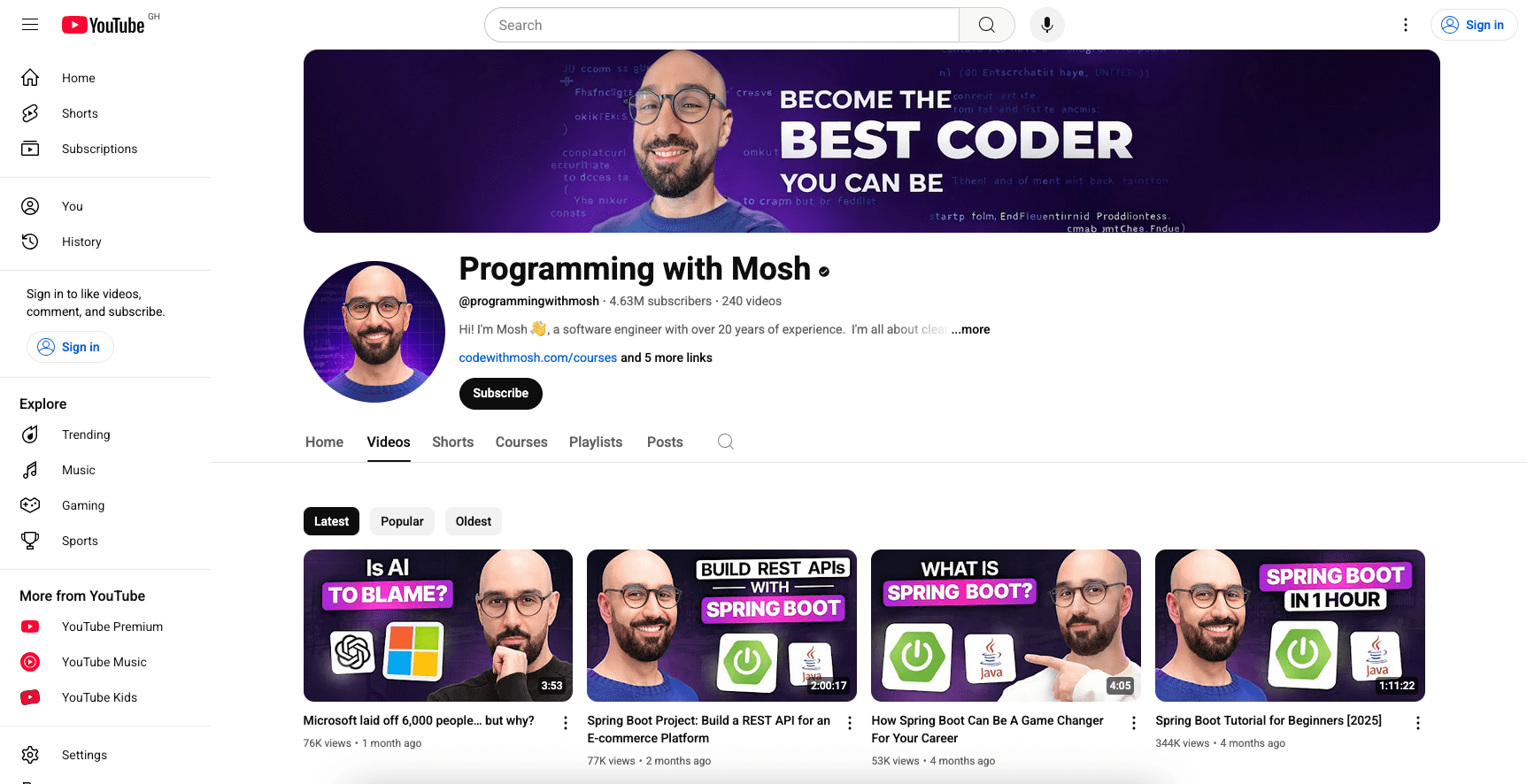
(III) techTFQ
techTFQ specializes in interview preparation and practical problem-solving, making it invaluable for job seekers and professionals preparing for technical assessments in data-related roles.
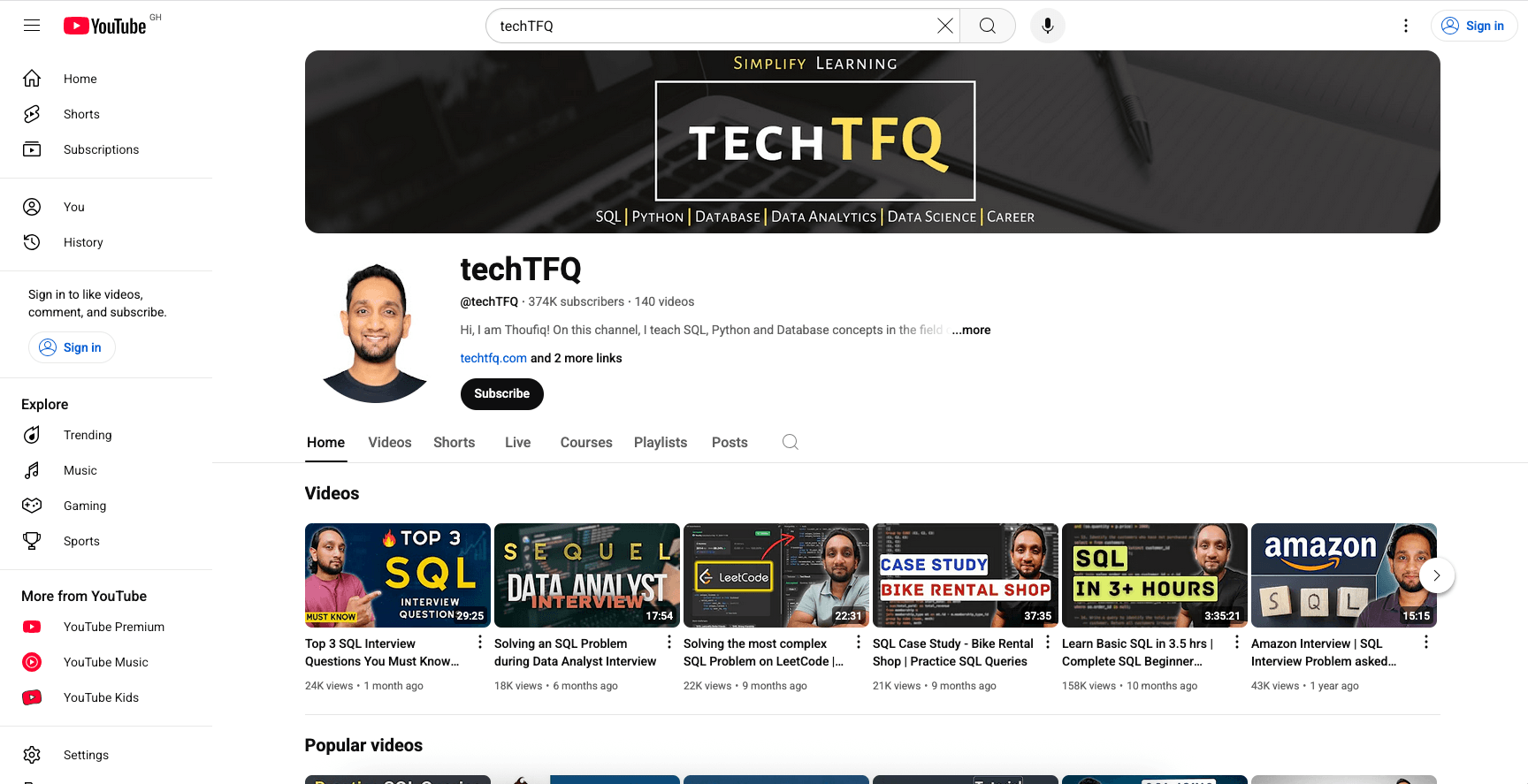
2. Udemy
Udemy provides comprehensive, instructor-led courses that offer structured learning paths with lifetime access, making it ideal for learners who prefer organized curricula and the ability to revisit material as needed.
Strengths:
Below are some of the top SQL learning courses on Udemy, each with distinct strengths and specializations.
(I) Jose Portilla's "Complete SQL Bootcamp"
Jose Portilla's course represents the gold standard for comprehensive SQL education on Udemy, with enrollment and rating metrics that demonstrate its effectiveness across diverse learner populations.

(II) Colt Steele's "Ultimate MySQL Bootcamp"
Colt Steele's MySQL-focused course provides specialized training in one of the most popular database systems, with emphasis on modern features and best practices.
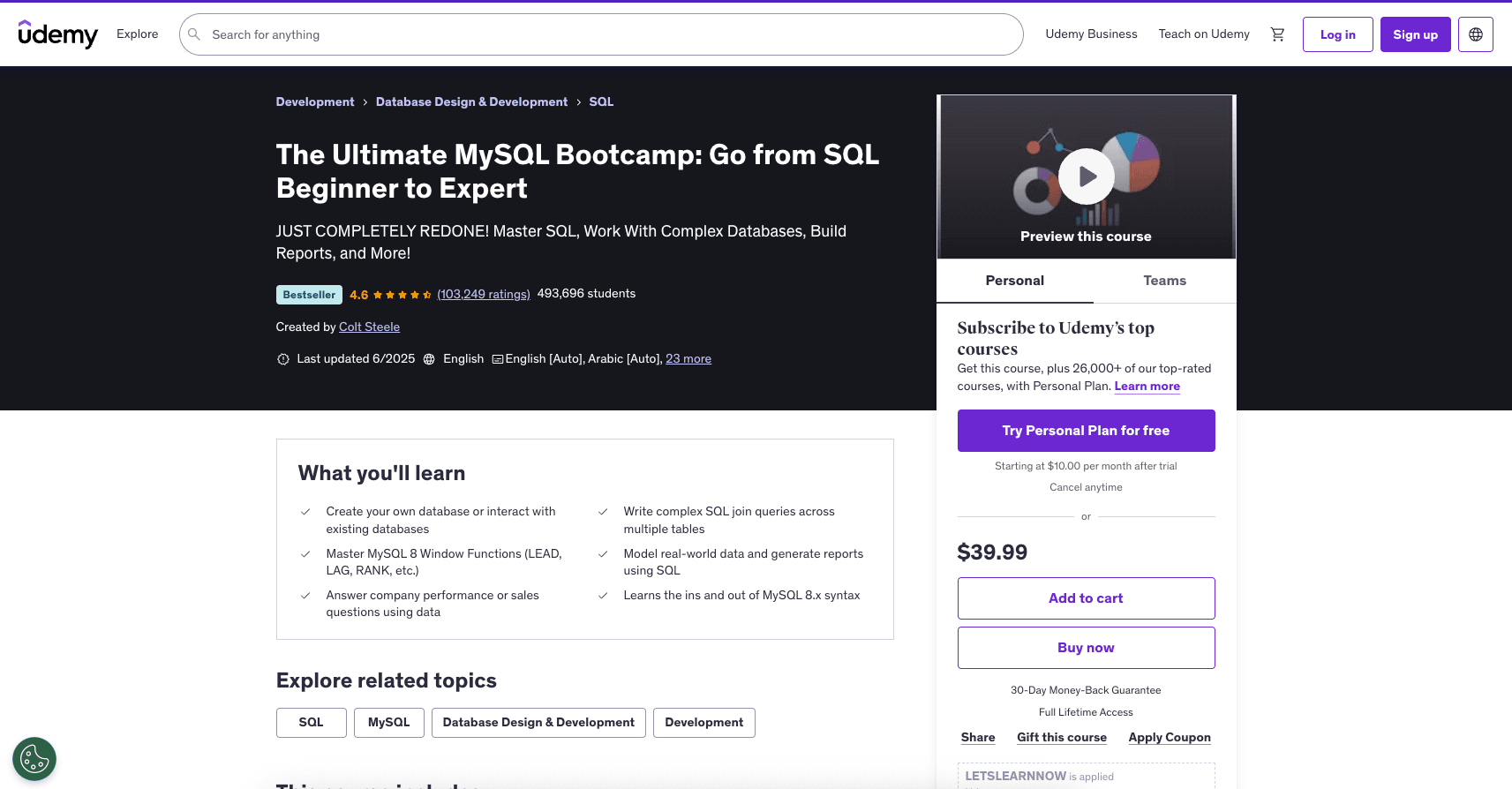
(III) 365 Careers Team
The 365 Careers Team demonstrates scalable education delivery with corporate validation, making their courses particularly relevant for business professionals seeking career advancement.
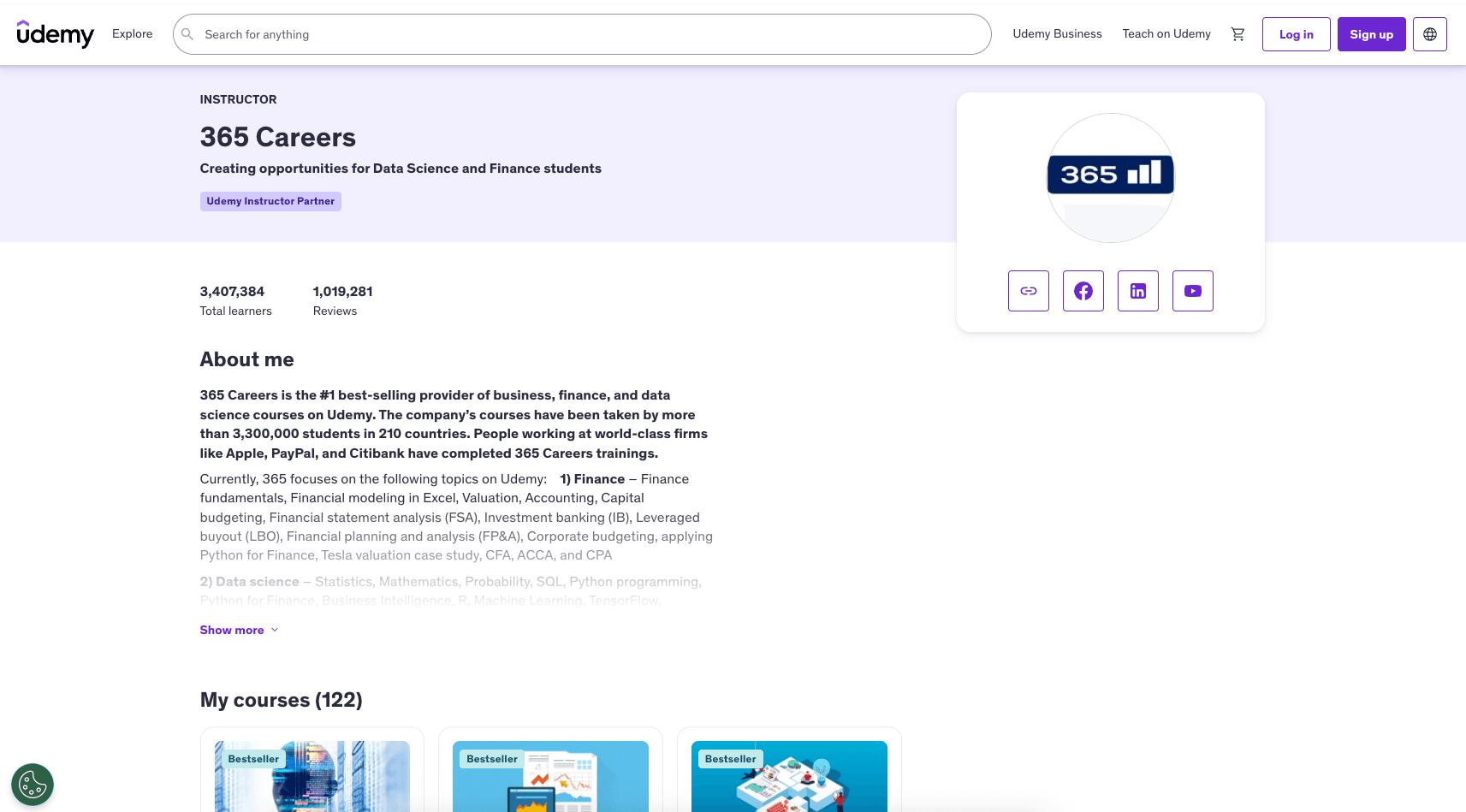
(IV) Start-Tech Academy
Start-Tech Academy specializes in Excel-to-SQL transitions, offering unique value for professionals making this specific career move.

3. Codecademy
Codecademy's interactive approach distinguishes it from video-based platforms by providing immediate feedback and hands-on coding experience that accelerates skill development through practice.

4. SQLZoo
SQLZoo offers a unique tutorial-style approach that allows for self-paced learning while providing immediate validation of query results, making it valuable for independent learners.
It is best for self-paced learners who prefer tutorial-style instruction and want immediate feedback on their SQL queries without the structure of formal courses.

5. Coursera
Coursera brings academic rigor and university-level instruction to SQL education, providing formal credentials that carry weight in professional environments.
Best for learners seeking academic rigor with university-level instruction and formal credentials that enhance professional profiles and career advancement opportunities.
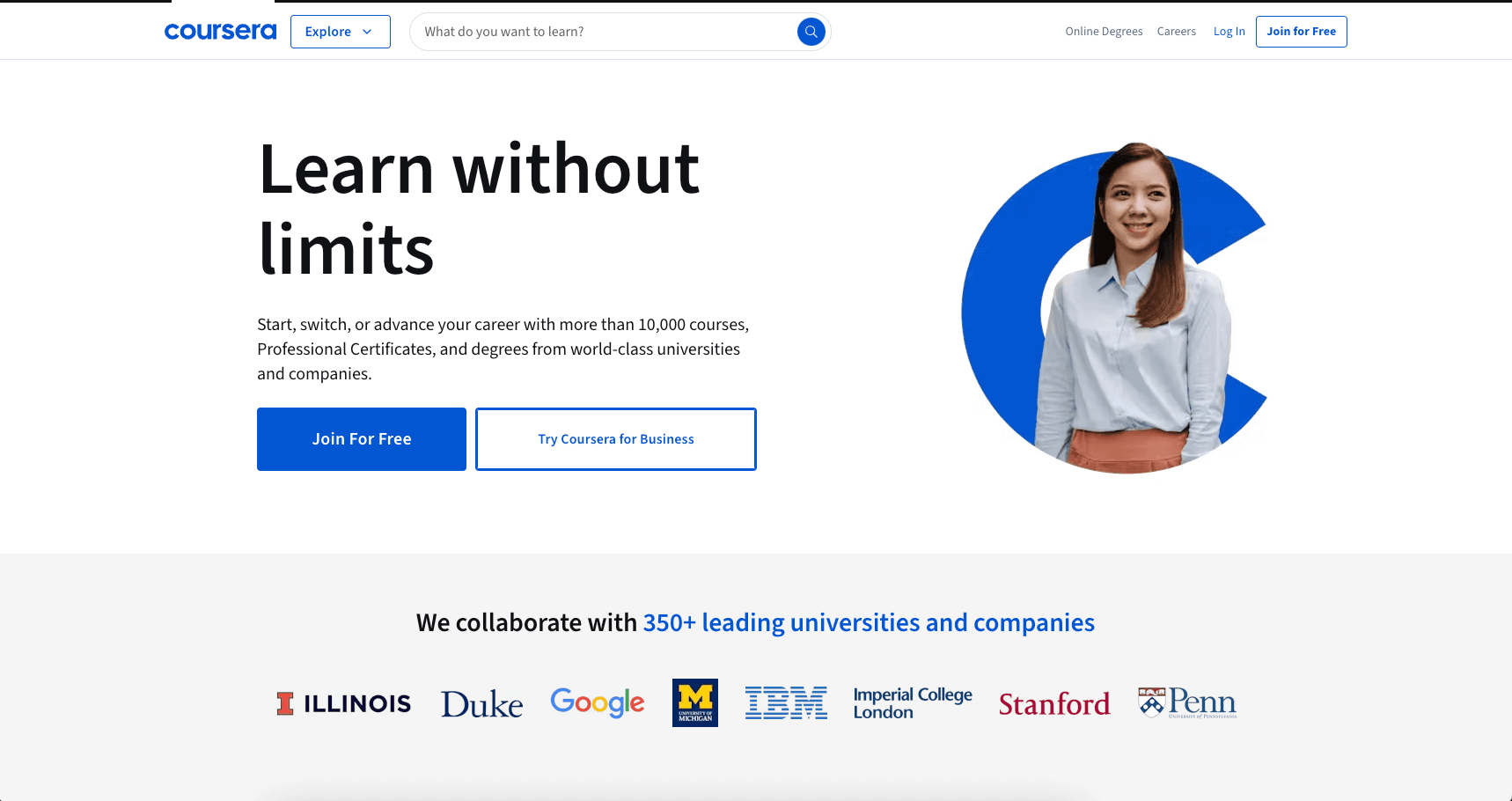
6. W3Schools
W3Schools serves as an essential reference resource that complements formal education with quick access to syntax examples and concept clarification.
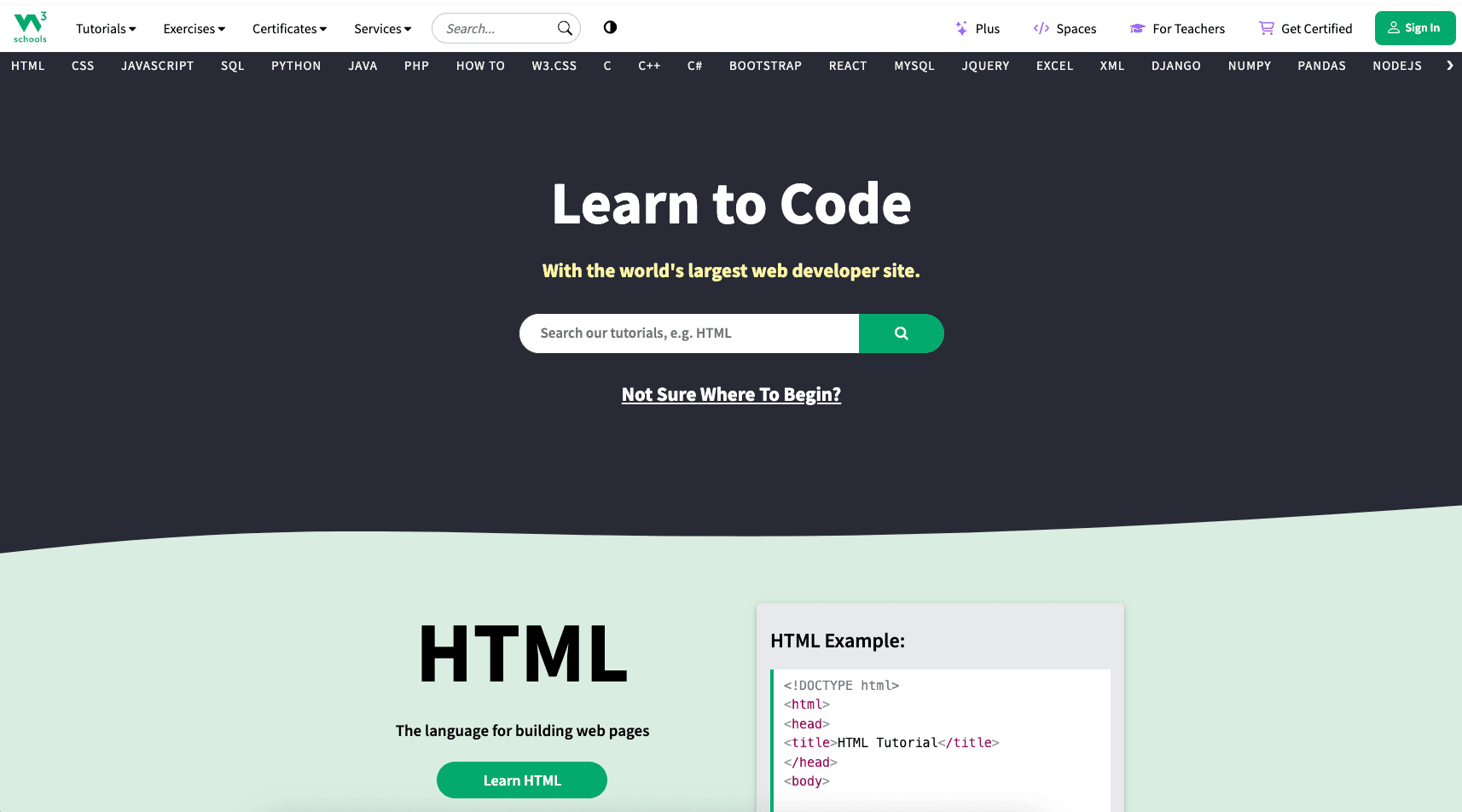
7. the Table
the Table represents a sophisticated approach to SQL education that bridges basic syntax learning with professional database management and real-world application scenarios.

The Table covers everything from fundamental techniques to cutting-edge database features and advanced concepts that prepare learners for senior-level responsibilities:
Having explored the diverse landscape of SQL learning platforms, it's important to understand the common challenges that learners encounter and how to navigate them successfully.
Common Pitfalls for SQL Newcomers and How to Avoid Them
Even with excellent educational resources, the transition from Excel to SQL presents specific challenges that can impede progress and frustrate learners. Understanding these common pitfalls and implementing strategies to avoid them will accelerate your learning journey and build confidence in SQL application.
Below are some of the most frequent mistakes newcomers make in SQL, along with practical strategies for avoiding these issues:
These challenges are normal parts of the learning process, and awareness of these common pitfalls will help you develop better SQL practices from the beginning of your journey. Next, let's examine how mastering SQL and database tools can significantly impact your analytical capabilities and career trajectory.
How Mastering SQL and Database Tools Unlocks Deeper Insights and Career Growth
Deeper Data Insights
Career Growth in Analytics
This section talks about the impact of SQL and database tools mastery in the analytics career.
It’s a wrap!
Conclusion
The right SQL learning platform can make the difference between months of struggling and weeks of real progress. Each platform has its strength: YouTube for practical instruction, Udemy for structured courses. Match the platform to how you learn best: visual, interactive, or self-paced.
As you advance, you'll want professional tools like DbVisualizer to write better queries and manage multiple database connections with confidence.
Choose your platform thoughtfully and start consistently. You'll be solving real data problems sooner than you think.


